‘They Own the System’: Amazon Rewrites Book Industry By Marching Into Publishing (#GotBitcoin?)
The retail giant, the world’s largest public company, commands an unrivaled customer base for the books, e-books and audiobooks it publishes. ‘They Own the System’: Amazon Rewrites Book Industry By Marching Into Publishing
Amazon.com Inc., which over more than two decades made itself the world’s largest book retailer, has created an unrivaled display window that can catapult titles from obscurity to must-reads.
More recently it has built something else: Its own line of published books.
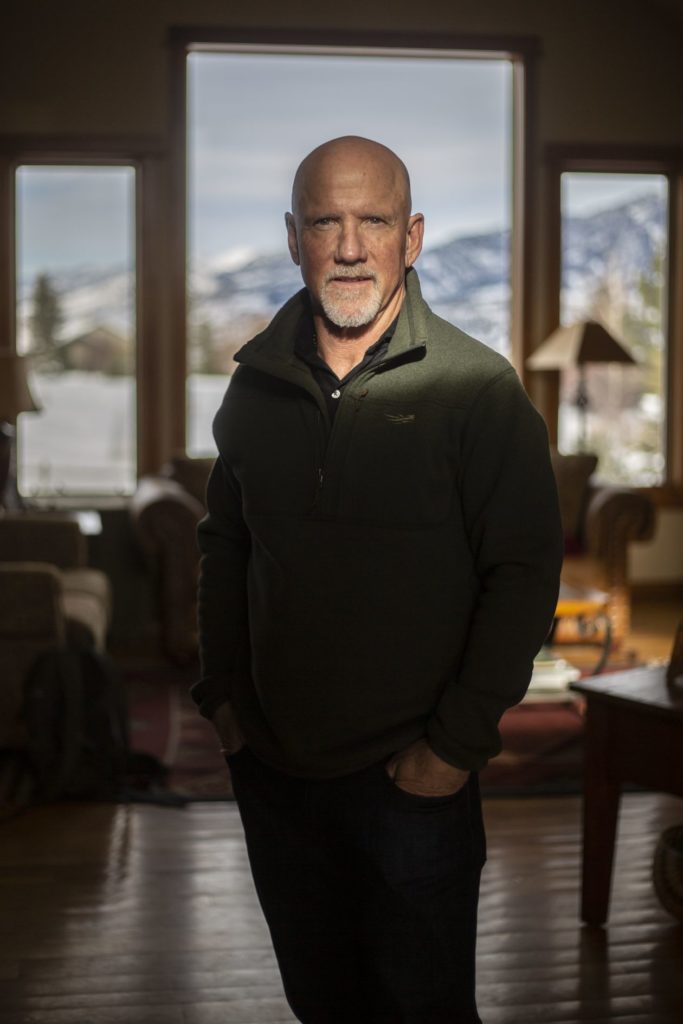
When veteran book author Mark Sullivan tried to sell a World War II saga in 2015, eight New York book publishers rejected it. Then Amazon’s publishing arm scooped up “Beneath a Scarlet Sky” for an advance in the low five figures.
The novel was released in 2017 and featured on Amazon First Reads. The online promotion also is emailed each month to more than 7 million U.S. subscribers and exclusively showcases titles from Amazon Publishing.
“Wham, we get 300,000 downloads,” said Mr. Sullivan, whose title has sold more than 1.5 million print books, e-books and audio books. It was ranked No. 56 on USA Today’s top 100 best-seller list for all of 2018.
The Seattle-based giant houses 15 imprints in the U.S. under the Amazon Publishing banner, turning out everything from thrillers to romance novels to books translated from other languages. Amazon published 1,231 titles in the U.S. in 2017, up from 373 in 2009, the year it entered the $16 billion-a-year consumer book publishing business.
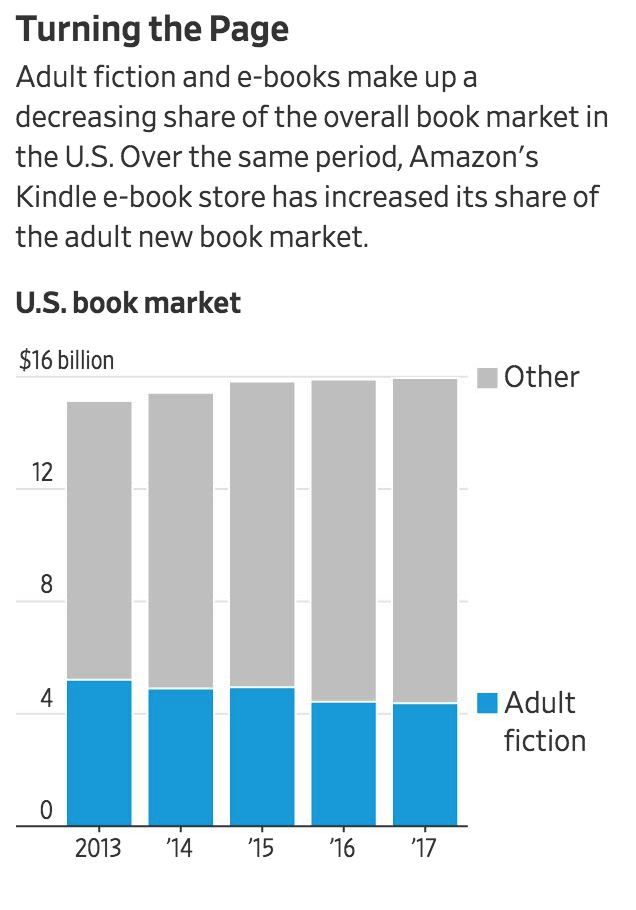
To promote these works, it has tools other publishers can only dream about owning, including Amazon First Reads and Kindle Unlimited, Amazon’s e-book subscription service. Together, they reach an estimated 10 million or more customers who can read offered titles with a few keystrokes.
“They aren’t gaming the system,” literary agent Rick Pascocello said. “They own the system.”
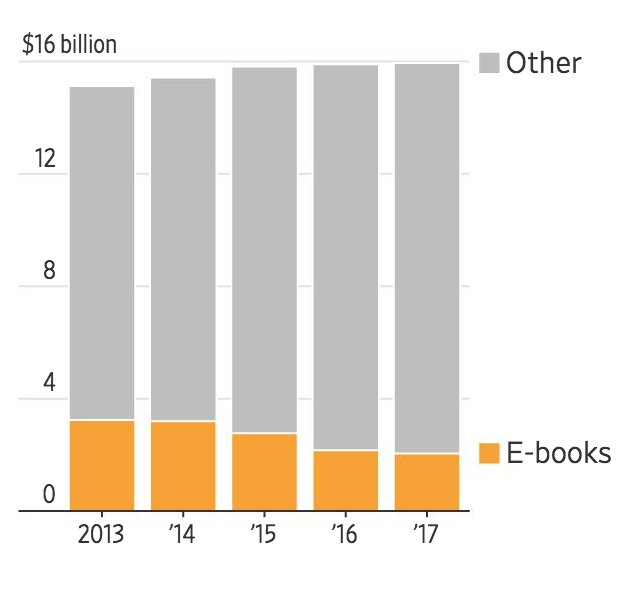
The promotional levers that Amazon has built to lure consumers can boost the opportunities of little-known writers and recharge the careers of experienced authors such as Mr. Sullivan. Amazon Publishing, the company’s book-publishing unit, together with its self-published authors, has made it a fierce competitor in lucrative genres including romance.
To some in the industry, it is an inherently conflicted structure, in which the most powerful retailer has a competing incentive to favor books it publishes and those from authors using its self-publishing technology.
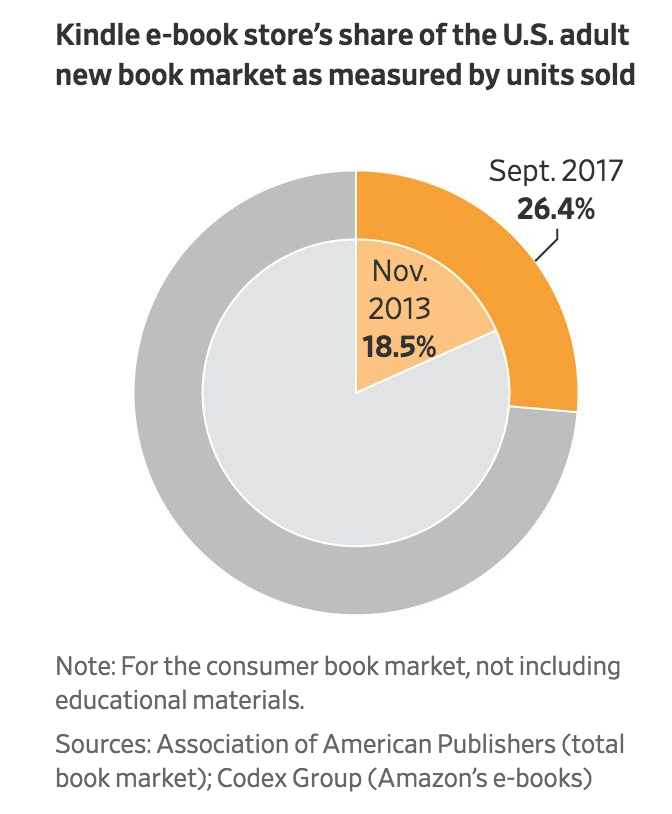
On Wednesday, 16 of the top 20 books on Amazon’s romance best-seller list were titles from its book-publishing arm or were self-published on Amazon’s platform.
Amazon said its marketing and retail programs don’t give its books an unfair advantage, and that it offers all publishers a chance to use them.
“Our focus is on making sure that our customers get great content,” said Jeff Belle, vice president of Amazon Publishing. “The feedback from authors, customers and agents has all been positive.”
Amazon commands some 72% of adult new book sales online, and 49% of all new book sales by units, according to book-industry research firm Codex Group LLC.
Tensions over Amazon’s role as a retailer and a producer of goods extend to other parts of its business. As the company develops more of its own private-label goods and aggressively promotes them, it faces complaints from competing merchants and brands that sell on its site.
“Amazon’s private label products are approximately 1% of our total sales,” the company said in a statement.
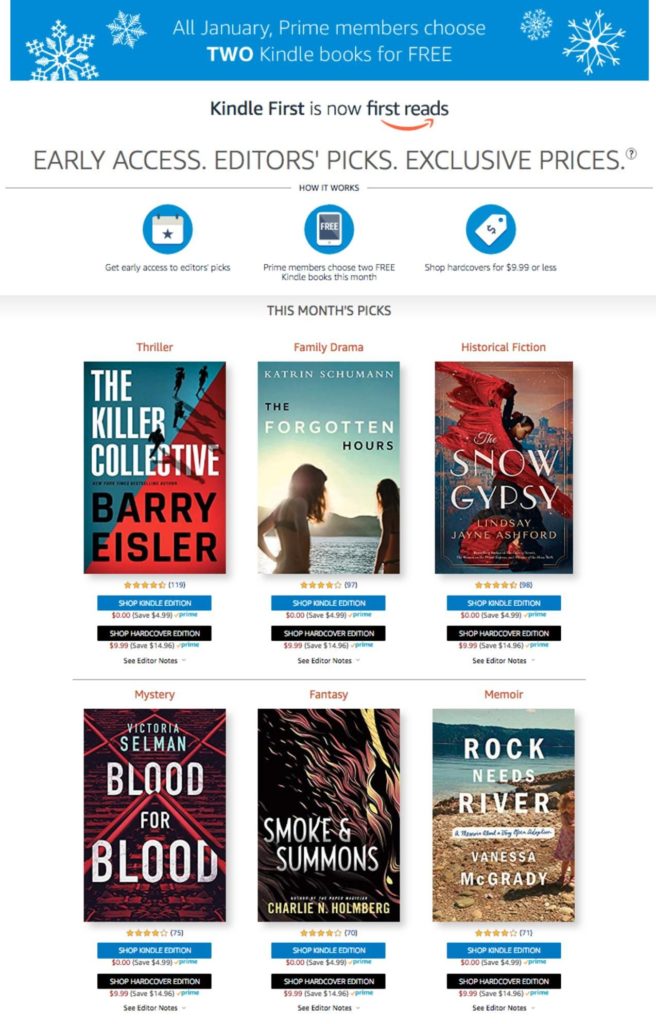
The tech giant, which got its start as an online bookseller in Jeff Bezos’ garage in 1994 to become the world’s largest public company, is estimated to have more than 550 million retail items of all kinds on its website, as well as data from billions of customer transactions. Amazon’s digital advertising business is the third largest, after Google and Facebook .
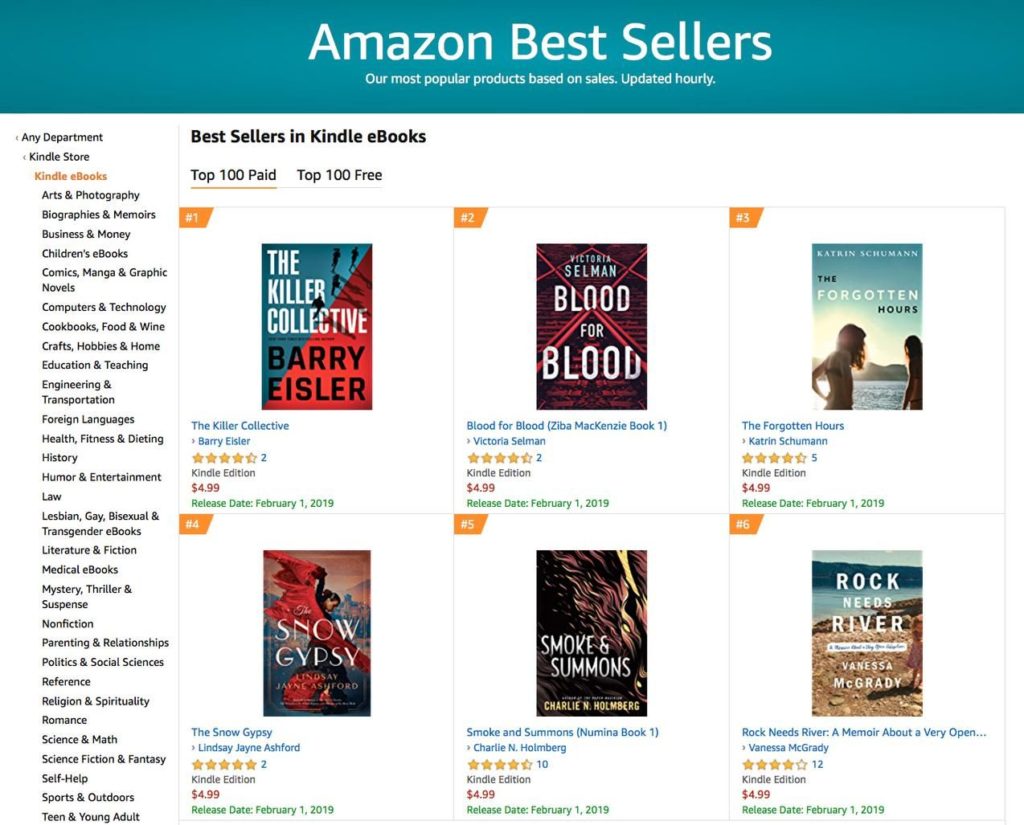
For authors, the company offers a huge potential audience, especially given the decline in large bricks-and-mortar bookstores. Amazon has more than 100 million Amazon Prime members world-wide, and its U.S. subscribers can pick one title from Amazon First Reads free each month. Non-Prime members pay $1.99.
On Jan. 2, Amazon First Reads sent an email to members about six new titles from Amazon Publishing. By early evening, those books were the top six on Amazon’s Kindle store e-book best-seller list.
The power extends to Amazon’s $9.99-a-month Kindle Unlimited e-book subscription service. The service enables subscribers to select as many as 10 e-books at a time. It had an estimated 4.6 million paid subscribers in June 2018, according to Codex. Amazon Publishing titles and Amazon’s self-published books get prominent display, industry executives said,
All six January Amazon First Reads selections reached the top of the Kindle e-books best-seller list on the same day they were emailed to subscribers.
Kindle Unlimited gives authors a better shot at making many of Amazon’s e-book best-seller lists, which counts every title chosen by subscribers as a sale. The subscription service is open to rival book publishers.
This month, CBS Corp.’s Simon & Schuster publishing unit put approximately 80 titles on Kindle Unlimited. The publisher wants to see if the program can generate new readers for some of its established authors.
Amazon declined to reveal the royalty rates it pays publishers for books in Kindle Unlimited. Major publishers typically generate $7.00 in revenue from a 300-page e-book priced at $10 and sold through a typical retail website.
Romantic Interest
The scale of Amazon Publishing isn’t readily apparent because many rival booksellers decline to carry Amazon Publishing titles on their shelves.
“They get enough support on their own,” said Lori Fazio, chief operating officer of R.J. Julia Booksellers in Madison, Conn., which doesn’t stock them.
Amazon operates 18 Amazon Books retail stores, including two in Manhattan.
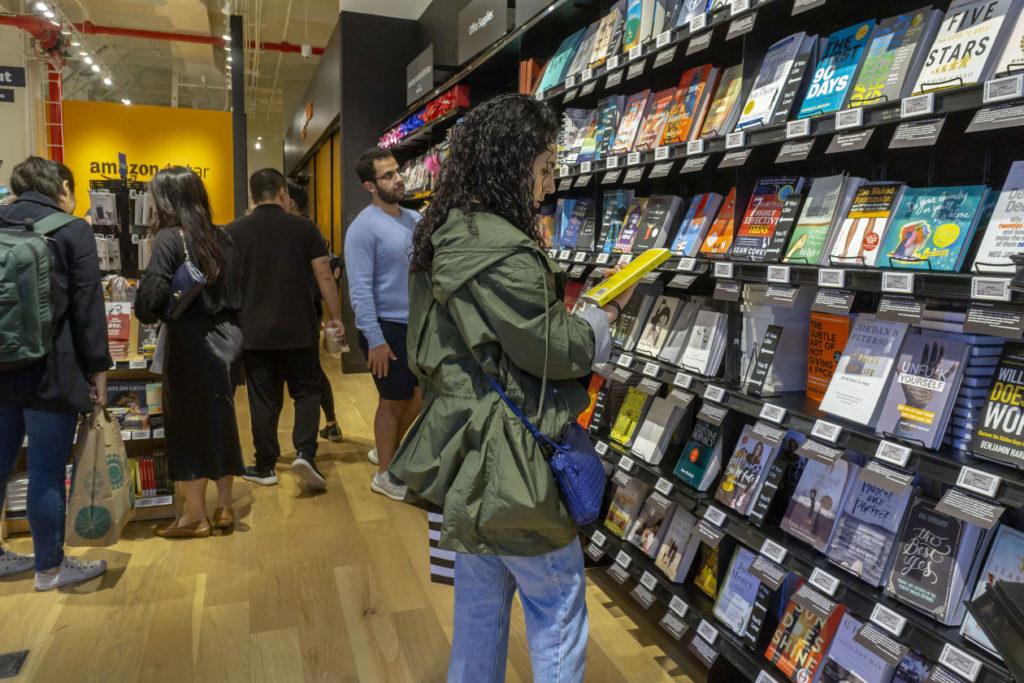
Industry trackers say Amazon is shrinking publishing revenue in adult fiction by releasing so many low-price books from Amazon imprints and its self-published authors. Publisher revenue from adult fiction fell 16% to $4.4 billion in 2017 from 2013, the Association of American Publishers said.
“My suspicion is the cumulative impact of Amazon’s highly integrated retail and content programs is cannibalizing traditional publisher fiction sales.” said Peter Hildick-Smith, chief executive of Codex Group, the research firm.
Mr. Hildick-Smith said the decline in revenue for fiction issued by traditional publishers coincided with the Kindle e-book store’s growing share of the overall adult book market—up 43% between 2013 and 2017—to a bit more than a quarter of the total market. E-books skew heavily to fiction, and much of that increase comes from books self-published on Amazon.
Publishers that specialize in genre fiction, especially romance—a fount of publishing profits—are feeling the biggest impact.
Steven Zacharius, chief executive of Kensington Publishing, said he has reduced the number of romance titles he publishes because of the large number of competing romance titles from Amazon Publishing, as well a boom in low-price, self-published titles. “It’s affected all romance publishers,” he said.
In 2017, Harlequin, a division of HarperCollins Publishers, closed five romance lines, saying it was responding to “changes in retail landscape and readership preferences.” HarperCollins Publishers, which paid $414 million to acquire Harlequin in 2014, is a unit of The Wall Street Journal’s parent company, News Corp.
HarperCollins Publishers Chief Executive Officer Brian Murray described Amazon as a direct competitor and an “incredibly efficient distributor.”
Independent romance publisher Entangled Publishing LLC, offers a small number of erotic titles on Kindle Unlimited. For many titles, the small publishing house uses the distribution arm of a larger publisher to get its books into retail stores, a distributor that doesn’t participate in Kindle Unlimited.
As a result, most Entangled books aren’t likely to reach Amazon’s list of best-selling romance titles, which favors Kindle Unlimited titles. While Amazon has opened a lot of doors for authors and publishers, Liz Pelletier, Entangled’s chief executive said, the extra boost given to Kindle Unlimited titles makes Amazon’s best-seller list less applicable for publishers that don’t participate
That matters because the list of Amazon’s top 100 best-selling books plays a critical role publicizing new titles, she said, which translates into sales.
“The limited visibility means readers are more likely to miss out on some great books from small publishers,” she said.
By The Word
Self-published authors who join Amazon’s Kindle Select program give exclusive sales rights to Amazon for 90 days in exchange for special promotions. The deal gives Amazon a percentage of every sale, and buried among the titles could be an unexpected blockbuster.
For self-published authors, Kindle Select offers greater exposure at the risk of lower returns.

Under the arrangement, these titles are enrolled in Kindle Unlimited, which pays authors based on how many pages of an e-book are read. The payouts are usually around $0.004 cents to $0.005 cents a page. Authors would receive $1.20 to $1.50 on 300-page e-book priced at $10, less if readers don’t finish.
Romance writer Lisa Renee Jones pulled her titles out of Kindle Unlimited in 2018 after her income fell by about one-third over a few months.
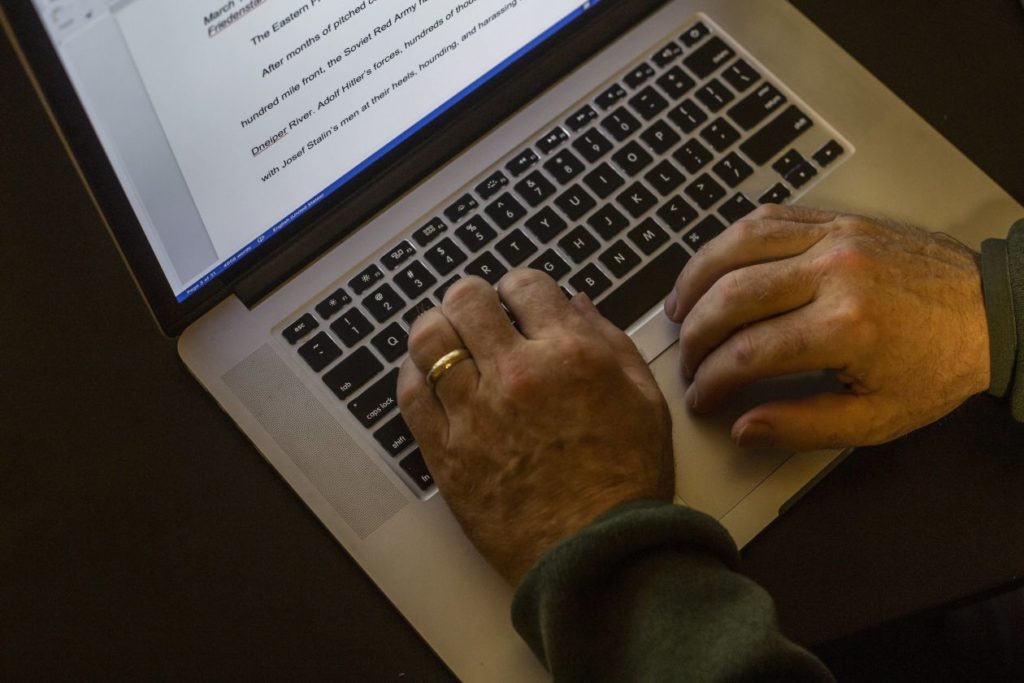
“I jumped on the bandwagon, but I later regretted it because it devalued me as an author,” said Ms. Jones, whose books have been published by St. Martin’s Press’s Griffin imprint and others.
An Amazon spokesman said thousands of self-published authors in 2018 “earned more than $50,000, with more than a thousand surpassing $100,000 in royalties.” The spokesman declined to say how many self-published books using Amazon technology were published last year. “Hundreds of thousands of authors have self-published millions of book since 2007,” he said.
Some have hit it big. Laurie Ann Starkey, a certified public accountant, quit her job in 2014 to become a full-time writer. She now owns a small independent press and employs 10 people as editors, managers and social-media staff. She generated $1.15 million last year in gross revenue, she said, mostly from her own books. About 89% of her sales were from Kindle Unlimited.
Romance writer Inglath Cooper’s self-published novel, “Down a Country Road,” was ranked No. 52 on Amazon’s digital romance list on Jan. 15. She said Amazon has changed publishing, much like Netflix changed the movie and TV business, by making a large inventory of books immediately available to readers.
“Rather than resent the changes,” Ms. Cooper said, “I prefer to choose the opportunities available.”
Amazon Publishing helped resurrect the career of Mr. Sullivan, whose World War II novel found little traction among New York publishers. Previously, he had written more than a dozen novels, including with author James Patterson.
“My son urged me to try Amazon,” he said.
In March 2017, the influential trade publication Publishers Weekly reviewed “Beneath a Scarlet Sky,” saying Mr. Sullivan “lays on history with a trowel in this overstuffed tale of derring-do set in Italy during WWII.”
Amazon told Mr. Sullivan not to worry. “It was such a compulsive read that I knew it had the potential to be a big book,” said Danielle Marshall, editorial director of Lake Union Publishing, the Amazon Publishing imprint.
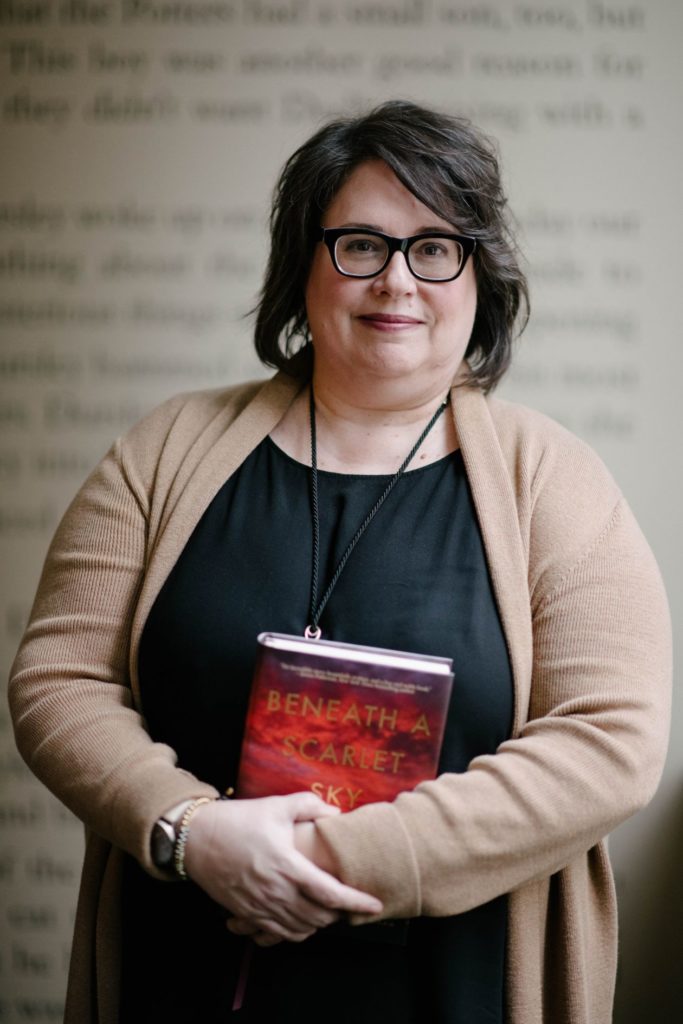
After a month, Mr. Sullivan’s novel had nearly 1,300 customer reviews and an average rating of 4.86 stars in the U.S. “Die-hard readers love to tell others what to read,” he said.
The book, which was initially released in e-book, audiobook and in paperback, soon shot to No. 1 on Amazon. Editions are rolling out in 33 foreign languages. Mr. Sullivan also has sold the film and TV rights.
Mr. Sullivan said he has earned “in the seven figures.” Rather than put his next novel up for auction, he struck a deal with Amazon’s Lake Union Publishing, which is expected to publish it in 2021.
Book Shopping on Amazon? Don’t Be Duped Into Buying A Summary
E-commerce giant pulls shortened versions of popular reads like Marie Kondo’s ‘Tidying Up’ and Timothy Ferriss’s ‘The 4-Hour Body’ after Journal inquiry.
Summaries of popular books have long been a staple in the publishing business. Now they are often hard to tell apart from the real thing.
Authors and publishers say they are concerned about a recent surge in summaries available on Amazon, some of which have covers that copy or mimic the original’s art and use the author’s name. Some consumers are mistakenly buying those summaries instead of the original works, they say, hurting their sales.
Summaries of top-selling self-help and business titles appear at or near the top of recent searches for the books on Amazon, a Wall Street Journal analysis found. In some cases, the covers of the summary and the original book were very similar—aside from a “summary” label at the top.
“Quite a few readers reach out to me scratching their heads, asking for refunds, etc. after buying such editions with confusingly similar fonts” and cover art, said Timothy Ferriss, author of such best-selling titles as “The 4-Hour Body” and “The 4-Hour Workweek,” in an email.
After the Journal contacted Amazon.com Inc. last week, the company said it would remove the works from its store that violated its rules and subsequently pulled a number of summary titles highlighted by the Journal.
Amazon, much like Alphabet Inc.’s Google and Facebook Inc., has come under pressure to do a better job policing inappropriate activity on its platform. The company has struggled to entirely weed out makers of counterfeit products, as well as sellers who are finding new tricks to outsmart Amazon’s automated product-ranking system. Its sponsored-item advertisements have come under criticism for looking similar to regular listings and appearing in unexpected spots such as people’s baby registries. The book summaries, typically self-published using Amazon’s tools, are the latest challenge.
Publishers say the current offering of summaries—which retail for a fraction of the original’s price—differ from past ones such as CliffsNotes, which often had generic covers that looked nothing like the original, and ranked lower in search results.
The new breed of summary publishers have used Amazon’s powerful advertising platform to their advantage, buying up keywords that ensure their products appear above those of nonpaying sellers—albeit with a “sponsored” tag above the title. Sometimes, the summaries even carry a “best-seller” label.
Andy Walker, a 70-year old retiree who lives in the Detroit area, said in an interview that in mid-January he ordered what he thought was a copy of Steven R. Gundry’s “The Plant Paradox” on Amazon. After he started to read it, he realized he had bought a summary by mistake. The cover was similar to the original book, and it had the author’s name on the front. “The lesson is to be watchful for the word summary,” he said.
A search for “Grit: The Power of Passion and Perseverance,” by Angela Duckworth, on Tuesday listed the book summary, which was a sponsored result, ahead of the entry for the actual book. In one online review, someone claims to have inadvertently purchased the summary instead of the book, saying, “I did not read the title as closely as I should have.”
“It’s frustrating,” said Ryan Holiday, author of “The Obstacle Is the Way: The Timeless Art of Turning Trials into Triumph,” referring to several summaries of his book for sale on Amazon. “It’s hard to get a reader to the point where they are ready to buy your book, and then somebody else swoops in.” Mr. Holiday said that it would “be hard to argue that these knockoffs don’t end up costing authors some sales.”
The impact can be significant, with one publisher estimating that tens of thousands of summary print copies have been sold of best-selling books. The person said the industry had no way of measuring the sale of e-book summaries.
Amazon said in a securities filing last week that it may not be able to prevent sellers “from selling unlawful, counterfeit, pirated, or stolen goods, selling goods in an unlawful or unethical manner, violating the proprietary rights of others, or otherwise violating our policies.”
An Amazon spokesman said the company required that book summaries “be sufficiently differentiated to avoid customer confusion.”
“If we find that a title doesn’t meet these requirements, we remove it promptly,” he said.
Among the titles removed by Amazon last week after the Journal inquired were several summaries of Marie Kondo’s “The Life-Changing Magic of Tidying Up.” The book, originally published in 2014, has gotten a lift recently, thanks to a related Netflix show that made its debut earlier this year. Both summaries that were subsequently removed appeared as sponsored results.
“As the publisher for Marie Kondo, we want to ensure that her copyrights, and those of all our authors, are protected, and we appreciate the support for this from our sales partners as well,” said Aaron Wehner, publisher of Ten Speed Press, which is owned by Penguin Random House.
Mary Rasenberger, executive director of the Authors Guild, an advocacy group with approximately 10,000 members, said in an email that Amazon is “generally very good about taking down pirated and trademark-infringing books. But they have not been able to filter them all out in the first instance.”
Peter Brown, a New York intellectual-property lawyer, said that summaries such as CliffsNotes that are intended “for educational purposes and provide commentary” are generally permitted under the copyright concept of fair use. Copying the text at length isn’t generally permitted, he said, because it appropriates the work of the author.
Summaries that use the same covers or mimic the covers of the original books may constitute unfair competition under state and federal laws, Mr. Brown added. Distinctive covers have value, he said, and those rights holders are protected. “It is really about causing confusion in the marketplace,” said Mr. Brown.
The cover of Ms. Duckworth’s “Grit”—originally published in hardcover in 2016 by Scribner, an imprint of CBS Corp. ’s Simon & Schuster publishing arm—depicts a group of large and small gray arrows pointing to the left against a white background.
On a cover for one of the book’s summaries, the gray arrows are going up and down.
“It has the appearance of being written and sanctioned by the author, and it’s not,” said literary agent Richard Pine, who represents Ms. Duckworth.
A spokesman for CompanionReads Summary, a Philadelphia-based book-summary publisher whose works include the summary of “Grit,” said most of its titles have been taken down by Amazon because they violated its publishing guidelines. CompanionReads now plans to exit from the book-summary business, he said. He described the summaries as offering analysis, commentary and opinion.
Asked why CompanionReads chose to imitate the original’s cover for its summary of “Grit,” the spokesman said it wanted to create “a similar vibe.”
Attempts to find contact information for several other book-summary publishers, including Millionaire Mindset Publishing, which sells summaries of books including Ms. Kondo’s “Tidying Up” and Mr. Ferriss’s “The 4-Hour Body,” were unsuccessful.
Related Articles:
Is It Really Five Stars? How To Spot Fake Amazon Reviews (#GotBitcoin?)
Amazon Targets Unprofitable Items, With a Sharper Focus on the Bottom Line (#GotBitcoin?)
Amazon, Amid Crackdown on Seller Scams, Fires Employees Over Data Leak (#GotBitcoin?)
Venmo And Amazon Hit By Breaches And Fraudsters (#GotBitcoin?)
Amazon And Bitcoin Provide Americans With Opportunity To Go Cashless And Cashierless (#GotBitcoin?)
These Companies Are Succeeding Despite Amazon Or A Slowing Economy (#GotBitcoin?)
Your questions and comments are greatly appreciated.
Monty H. & Carolyn A.
Go back
Leave a Reply
You must be logged in to post a comment.